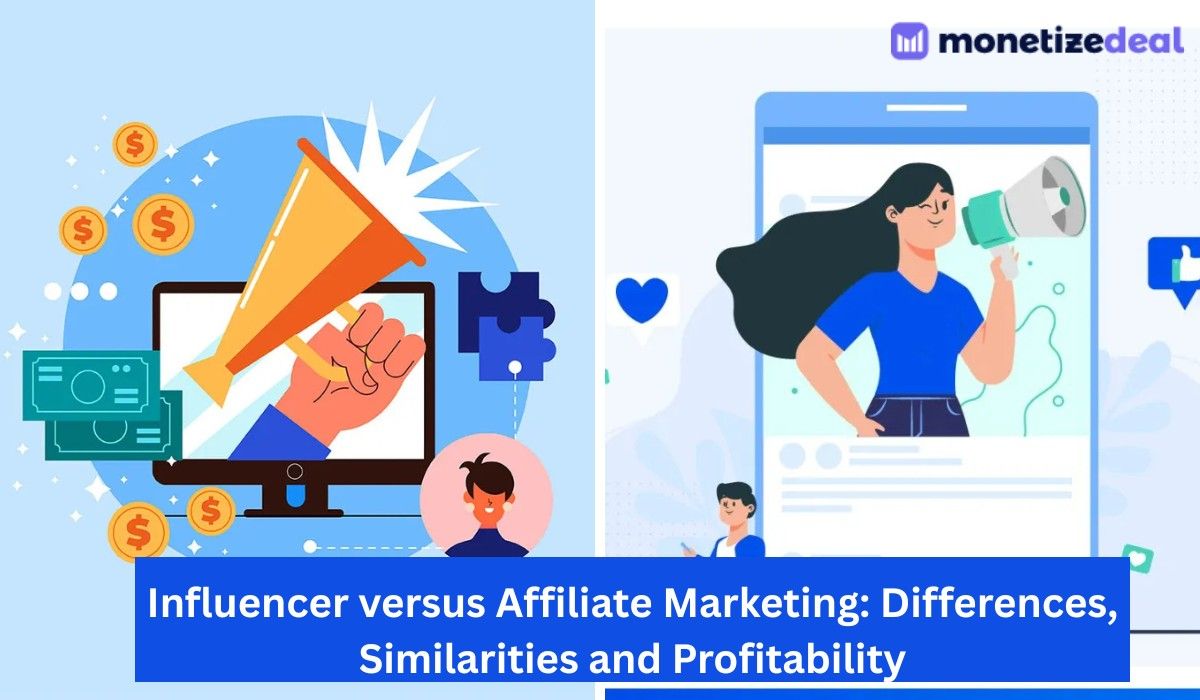Social Media
Influencer versus Affiliate Marketing: Differences, Similarities and Profitability

Last Updated on February 13, 2026 by Harsh Rajput
Over the past decade, marketing has seen a remarkable shift. Two key players have emerged in the field: Influencer Marketing vs Affiliate Marketing, One is Affiliate Marketing, the other is Influencer Marketing. These two tools have transformed the landscape for Direct-to-Consumer (DTC) and e-commerce brands, skyrocketing sales and conversions.
Did you know that over 80% of brands now incorporate influencer marketing into their strategies.
If you’re new to marketing scene, it’s essential to get a handle on both of these strategies. Understanding these strategies sets the stage for smoother sailing in your future marketing endeavors. If you overlook the details of each, you risk overlooking chances to broaden your audience and boost your brand’s growth.
Now one question remains – which one is the better choice: Influencer Marketing or Affiliate Marketing?
To answer this question, we’ll have to dig deep and understand the meaning of each of these marketing strategies, how they work, and eventually help you figure out the right fit for your business.
Ready to dive in?
What is Affiliate Marketing?

Affiliate marketing is a simple yet effective strategy for e-commerce businesses. Here’s how it works: you team up with individuals, organizations, or even media outlets (known as affiliates), who promote your products on their websites. They do this by sharing a unique link, and every time someone makes a purchase through that link, the affiliate earns a commission.
Think of it like a win-win situation. Your affiliates earn money for every sale they generate, which motivates them to ramp up their marketing efforts. They might even offer you prime advertising space on their websites to attract more customers to your products.
Affiliate marketing is a partnership where everyone benefits: you get increased sales, and your affiliates earn a piece of the pie for driving those sales your way. It’s a simple yet powerful way to expand your reach and boost your bottom line.
Benefits of Affiliate marketing
- Pay for Performance: In affiliate marketing, you only pay when your affiliates bring in actual results, like making sales or generating leads. It’s like hiring a salesperson who earns a commission for every successful sale they make.
- Connect with New Audiences: By teaming up with diverse affiliates, you can reach people you might never have reached otherwise. These affiliates have their own special groups of followers who trust their recommendations. It’s like having friends in different circles who introduce you to new people. This helps you target specific groups who are genuinely interested in what you offer, making your marketing efforts more effective.
- Build Trust with Recommendations: When affiliates endorse your products, they’re vouching for you. Their followers trust their opinions, so when they recommend your stuff, it carries a lot of weight. It’s like having a stamp of approval. This trust leads to more sales and happy customers who keep coming back for more.
What is Influencer Marketing?

Influencer marketing is a digital strategy where you team up with popular personalities who wield significant sway on platforms like Instagram or YouTube. These could be bloggers, celebrities, or social media stars with a massive following.
Your goal? To get your products featured seamlessly within the content they regularly share.
You’re essentially paying for your products to be showcased and your brand to be highlighted on the influencer’s channel.
Rather than opting for one-time collaborations, the golden rule is to foster lasting partnerships with influencers. This not only ensures consistency but also paves the way for achieving long-term objectives. After all, building trust and rapport takes time.
Benefits of Influencer Marketing
- Authentic Connections: Think of influencer marketing as a friendly recommendation from someone you trust. When influencers share their experiences with your products or services, it’s like receiving a tip from a close friend. Their followers trust their opinions and see them as genuine, just like you would trust a friend’s advice on where to find the best coffee or which book to read next. This authenticity creates meaningful connections between your brand and potential customers, fostering engagement and driving sales.
- Targeted Engagement: Influencers have their own unique communities and followers who share similar interests and passions. By teaming up with the right influencers, you can speak directly to the people who are most likely to be interested in what you offer. This targeted approach ensures that your message resonates deeply, leading to higher engagement and better results for your business.
- Boosted Brand Reputation: Collaborating with influencers elevates your brand’s visibility and reputation. When influencers showcase your products or talk about your services, it’s like getting a shoutout from a respected expert in your field. Their endorsement adds credibility and trustworthiness to your brand, much like receiving a glowing review from a trusted source.
What is the difference between Influencer Marketing and Affiliate Marketing?
Think of influencer marketing as tapping into the power of people you admire on social media. These individuals, known as influencers, use their influence and credibility to showcase products or services to their followers. It’s all about building genuine connections and trust through authentic content and endorsements.
On the flip side, affiliate marketing involves teaming up with regular folks or entities, called affiliates, who spread the word about products or services using special tracking links. Affiliates earn a commission for every sale or action resulting from their referrals.
While both methods aim to boost sales and raise brand awareness, influencer marketing is like creating a story and building a brand image, while affiliate marketing is more about earning rewards based on performance and direct conversions.
Nature of Partnerships:
- – Influencer marketing involves collaborating with individuals or personalities (influencers) to endorse products/services to their audience.
- – Affiliate marketing entails partnerships with affiliates who promote products/services through unique tracking links.
Focus of Promotion:
- – Influencer marketing emphasizes building relationships and trust with an influencer’s followers through authentic content creation and endorsement.
- – Affiliate marketing focuses on driving sales and actions through the affiliate’s promotional efforts.
Compensation Structure:
- – In influencer marketing, influencers are often compensated with a fee or free products/services for their endorsement.
- – Affiliate marketers earn a commission for each sale or action generated through their referral links.
Audience Engagement:
- – Influencer marketing relies on the influencer’s relationship and engagement with their audience to influence purchasing decisions.
- – Affiliate marketing focuses on driving traffic and conversions through targeted referral links, regardless of the affiliate’s personal influence.
What are the similarities between Influencer Marketing and Affiliate Marketing?
Influencer marketing and affiliate marketing have a lot in common when it comes to what they aim to achieve and how they go about it. They both bank on trusted individuals or groups to showcase products or services to their followers, with the goal of boosting engagement and sales. The key here is relying on the influencer’s or affiliate’s credibility and expertise to influence consumer behavior positively. What’s more, both strategies often rely on creating personalized content and telling stories that resonate with specific audiences, making it more likely for people to buy in. Ultimately, whether it’s through influencers or affiliates, the success of these marketing methods boils down to building genuine connections with audiences and instilling trust in the products or services being promoted.
- Performance-Based Compensation: Both influencer and affiliate marketing operate on a “you-get-what-you-earn” basis. This means that compensation is directly tied to the outcomes achieved, like sales, clicks, or conversions.
- Audience Trust and Credibility: Trust is the currency of the digital age, and both strategies bank on it heavily. Whether it’s influencers or affiliates, these individuals are trusted voices in their communities. When they vouch for a product or service, it’s like getting a recommendation from a friend—authentic and trustworthy.
- Content Creation: Both influencers and affiliates craft content tailored to their audience’s tastes and needs. It’s not about pushing products; it’s about creating engaging stories that resonate and inspire action. That personal touch makes all the difference.
- Targeted Marketing: It’s like hitting the bullseye every time. Influencers and affiliates know their audience inside out—they’re experts at reaching the right people with the right message. By honing in on niche communities, they ensure that the marketing message lands exactly where it’s meant to, increasing the chances of turning interest into action.
Affiliate Marketing or Influencer Program: Which One to Choose?
In the world of digital marketing, affiliate and influencer strategies aren’t competing forces; rather, they’re valuable tools in a brand marketer’s toolkit. The decision between the two hinges on factors like the product, target audience, and end goals. If conversions are the primary focus, affiliate marketing is the go-to, while influencer marketing takes a broader approach to casting a wide net.
Consider your audience when choosing a strategy—figure out the platforms your target market frequents. Also, factor in your budget, selecting a strategy that aligns with the level of risk and investment you’re comfortable with. It’s all about connecting with your audience effectively while optimizing resources for maximum impact.
To conclude -Influencer Marketing vs Affiliate Marketing
Influencer Marketing and Affiliate Marketing aren’t competitors; they’re more like teammates collaborating on the same playing field.
Rather than viewing influencer and affiliate marketing as opposites, it’s smarter to consider what you want to achieve with your campaign. Understanding your goals helps you pick the strategy that’s best suited to deliver the results you’re after.
You can seamlessly transition between influencer and affiliate strategies or even run simultaneous campaigns using both methods. The key is to stay open to experimentation while staying tuned in to what resonates with your audience.
Want to dive deeper into the world of affiliate marketing? Explore the latest tips and tricks on our blog, Monetizedeal blog. Let’s unlock the secrets together and turn your passion into profit!

Lubhanshi Lamba is a passionate and detail-oriented Content Writer Executive, skilled at creating engaging, well-researched, and SEO-friendly content across diverse niches. With a keen eye for storytelling and clarity, she combines creativity with strategy to deliver impactful write-ups that connect with audiences and drive results.

-

 List1 year ago
List1 year ago50 Best Telegram Channels For Movies and Web Series
-

 List6 months ago
List6 months ago20 Best Telegram channels for viral video link
-

 List1 year ago
List1 year ago50 Best Money Earning Apps in India Without Investment
-

 Finance1 year ago
Finance1 year ago10 Best Telegram Channels for Forex Trading Signals
-

 List2 years ago
List2 years ago500+ Funny YouTube Channel Name Ideas for 2026 | List of Top Comedy Channel names
-

 List2 years ago
List2 years ago25 Best Telegram Channels for Stock Market, Bank Nifty and Intraday Trading
-

 List2 years ago
List2 years ago20 Best SEBI Registered Telegram Channels in India 2026
-

 List1 year ago
List1 year ago120 Best Telegram Channel Links to Join in 2026



















